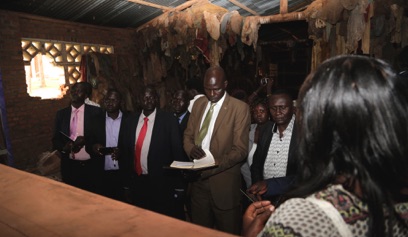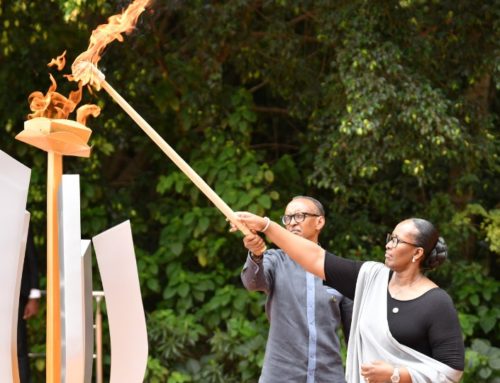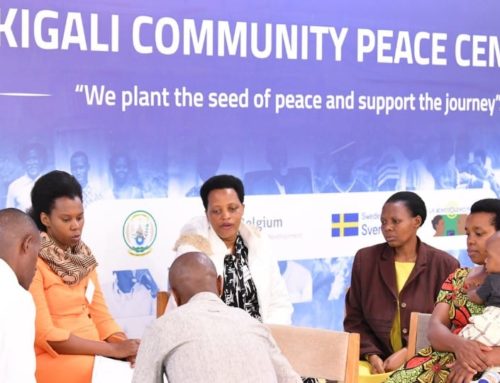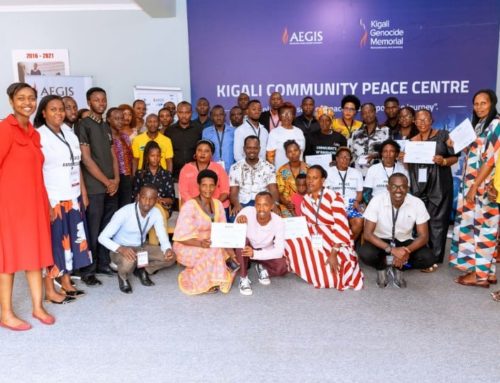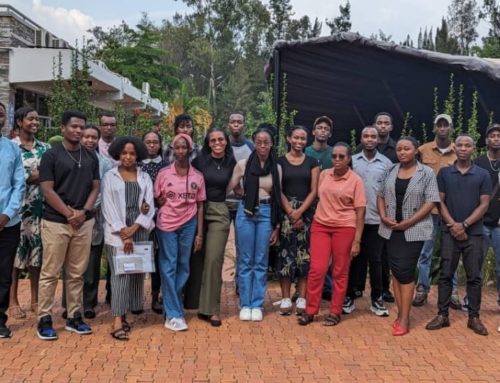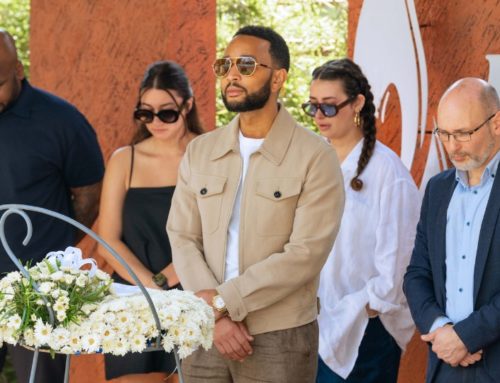Since December 2013, South Sudan’s civil war has left 50,000 people dead and driven 1.5 million from their homes – so far with little sign of an end in sight. There are, however, some glimmers of hope for the future; elements among South Sudanese civil society who believe important foundations for long term peace can be laid through education, building from the grassroots up. Increasingly, they are looking to Rwanda for inspiration – and finding it in the success of the Aegis Trust’s peacebuilding work there.
In early 2014, Aegis was contacted by a group of youth leaders from Juba. They were curious to know how Rwandans could live together after genocide. “What happened in Rwanda is not far from what is happening in South Sudan,” says Augustino Deng, Executive Director of the South Sudan Youth for Peace and Development Organisation (SSYPADO).
Visiting Rwanda during the 20th commemoration of the 1994 Genocide against the Tutsi, Augustino and his colleagues joined Rwandan youngsters to experience one of Aegis’ peace education workshops in action. They also met survivors and perpetrators of the genocide who have reconciled. The effect, according to youth leader Nicholas Aru Maan, was transformative. “I personally chose to forgive my maternal uncle’s killers after I visited Kigali and heard the testimonies,” he says. “If Rwandans made it, why not South Sudanese? ”
A second visit to Kigali followed, this time with paramount chiefs – who wield considerable influence in their communities – from Jonglei, Central Equatoria, Upper Nile and Unity State. The chiefs, likewise, were deeply moved. They insisted that Aegis should take its peacebuilding model to their country.
By December 2014, an Aegis team was in South Sudan to plan next steps. Aegis’ Youth Coordinator for Rwanda, Marc Gwamaka, was there to share insights with local youth leaders. The sense of connection was immediate. “Because they are going through a conflict, and we went through a genocide, they were saying, ‘Tell Aegis, we want to learn more from you guys in Rwanda’,” he recalls.
With support from the Swiss Government, Aegis’ representative in South Sudan, Ferdinand von Habsburg, helped to arrange an ‘Intergenerational Dialogue Exchange Programme’ for 5-12 April, sending a delegation of 35 South Sudanese civic leaders to Kigali. During an intensive week in Rwanda, participants had the opportunity to learn about the genocide, visit memorial sites, see how peace education is working, visit the Rwandan parliament and meet survivors and perpetrators who have found ways to overcome deeply painful divisions.
Structured to reflect South Sudanese diversity, the group included women and men of varying ages from different ethnic, religious and political backgrounds. They were drawn from locations all over the country, some of them representing displaced communities.
“When you take internationals to genocide sites here, there’s usually a strong initial feeling of shock,” says Aegis’ Regional Director, Freddy Mutanguha. “With the South Sudanese, however, there was instead this sense of familiarity with violent death. It began to dawn on us survivors just how much they, too, have lived through. What really amazed them wasn’t only the sites of killing: it was the reconciliation village.”
One of the delegates was MP Grace Abalang. “We went to a village in Eastern Province where the perpetrators and the victims are living together reconciled,” she says. “We the people of South Sudan have to copy the same. We have to say, ‘Yes, we have done wrong,’ apologise, forgive each other and move on.”
“In my past I felt that I couldn’t forgive,” says another delegate. “Now, after I saw that big heart of Rwanda, I can.”
Before heading home, some of the delegates offered comments on camera in Kigali, which you can see here. On 13 April, they also gave a press conference in Juba. The story ran nationwide in South Sudan and was picked up internationally by VOA, among others. A consistent theme in feedback from the group was the urgency of further and wider engagement from Aegis, both at a grassroots level in South Sudan and among the political elite.
Before the month was out, a government delegation from South Sudan was back in Kigali – this time with seven cabinet ministers. Their itinerary was principally development-focused, but included a visit to the Kigali Genocide Memorial, the final resting-place for some 250,000 victims of the 1994 genocide, where Aegis first piloted its peace education workshops in Rwanda.
“We need reconciliation and unity lessons, “ South Sudan’s Transport Minister Kwong Danhier Gatluak told the Rwandan press. “We have citizens who were subjected to terrible brutality. We need to unite all these people.” Julius Moilinga MP, Chair of the Public Service Committee, added: “We are not just here to see, we want to emulate Rwanda.”
“People say that I am a changed person,” says Grace Abalang MP, reflecting on the impact of her own visit to Kigali. “Rwandans know where they come from and where they are going…. For us, we know where we come from, but not where we are going. That is the big problem. We need to stop death and destruction in South Sudan.”
Turning that desire into life-saving reality will be a massive challenge requiring investment, long-term development and peacebuilding nationwide. The youth leaders of SSYPADO aren’t letting that put them off, however, making a start with schools on their doorstep. “South Sudan should be seen as a state leaning to genocide,” says Augustino Deng. “Peace education is the only way we can try to change the ideology of the young generation.”
He and his colleagues now want Aegis to help them take peace education further. “We really love to work hand in hand with the Aegis Trust. We really feel they have something that we have in common with them,” Augustino says. “We would appreciate if the work of Aegis could not stop in Rwanda, but go out to other places, especially South Sudan.”

